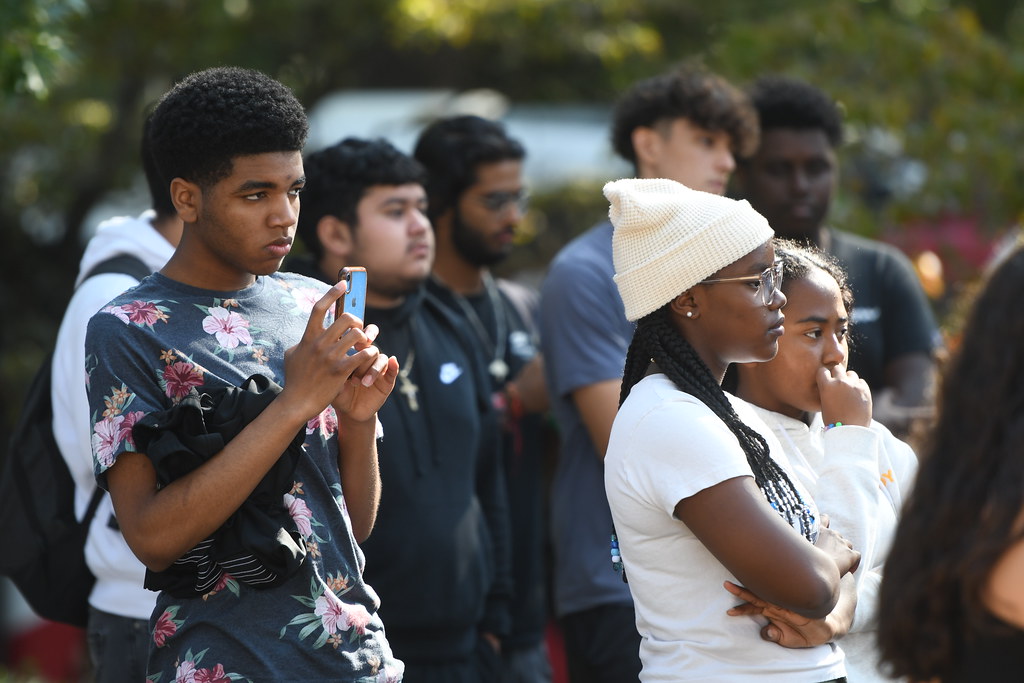The ODYSSEY Media Group has chosen 15 of our favorite stories celebrating Black History, Excellence and Joy from the past three years.
Text reading “Black History Month at CCHS” sits on top of a graphic with paint splashed in Black History colors. Students in the Journalism 1 class produced scenes on influential Black figures in the Clarke Central High School community to celebrate this month. Graphic by Anna Shaikun
Even as Black History Month draws to a close, these members of the CCHS community will continue to exemplify excellence.
Click here to see the full package.
More from Staff
Package by Anna Shaikun
Black History Month Book Highlights (2022)
Three books written by Black female authors and focused on Black stories are shown. Members of the ODYSSEY Media Group staff provided recommendations in honor of Black History Month. Stories by Natalie Schliekelman, Anna Shaikun and Maya Shirvastav, graphic by Lea D’Angelo
Members of the ODYSSEY staff provide reviews of books written by Black female authors focusing on Black stories.
Click here to see the full package.
More from Natalie Schliekelman
More from Anna Shaikun
More from Maya Shrivastav
Celebrating color (2022)

Sophisticated Steppers With Attitude performer Ariana Smith, a sixth-grade student at Burney-Harris-Lyons Middle School, performs at Clarke Central High School’s “A Night of Color” on March 23. Gifted Minorities Achieving member and event co-organizer Ayanna Lonon believed the performance was a hit. “When I reached out to (SSWA coach) Tammi Johnson, I could not have imagined the amazing job they would do,” Lonon said. “I loved talking with some of the girls on the step team. They were all so excited, and I was happy to see them live what they do, and do it well.” Photo by Aza Khan
Members of the Gifted Minorities Achieving organization hosted a celebration of Black culture in the CCHS Media Center on March 23.
When February begins, it also marks the start of Black History Month, an annual celebration of Black culture. However, members of the Gifted Minorities Achieving organization at Clarke Central High School believe the celebration should not be limited to a single month.
On March 23, the GMA hosted “A Night of Color: Black History does not end in February” in the Media Center. While the event was originally planned for February, the GMA wanted to show that Black culture should be celebrated after Black History Month.
“It was important to have the event set in March instead of February, because I know the school has done past events to celebrate Black culture for Black History Month. However, I don’t think we, as a whole, considering the school’s main population are African Americans, (have ever) just sat down to celebrate it,” GMA member and co-organizer Jael Flores-Zacarias said. “(To plan the event), you had to rely a lot on your teammates. Obviously, everyone (had) a vision, however, you couldn’t do everything. We just had to hope that everyone would do the part they said they would.”
Click here to read the full story.
Black History Month at CCHS 2023
The ODYSSEY Media Group celebrates Black History Month. Students in the Journalism I class produced spotlights on influential Black figures in the Athens community, like Whitehead Road Elementary School Principal April Braswell. “Black Excellence for me just means going above and beyond to create this space of excellence, good quality work, just high expectations. Just know who I am, I’m proud to be who I am. I’m proud of the work that I do. I look forward to doing much more in the future,” Braswell said. Graphic by Anna Shaikun
Journalism I students showcase examples of Black history, joy, and excellence in members of the Athens community.
Click here to see the full package.
Stories by Staff
Packaged by Anna Shaikun
Breaking barriers (2023)
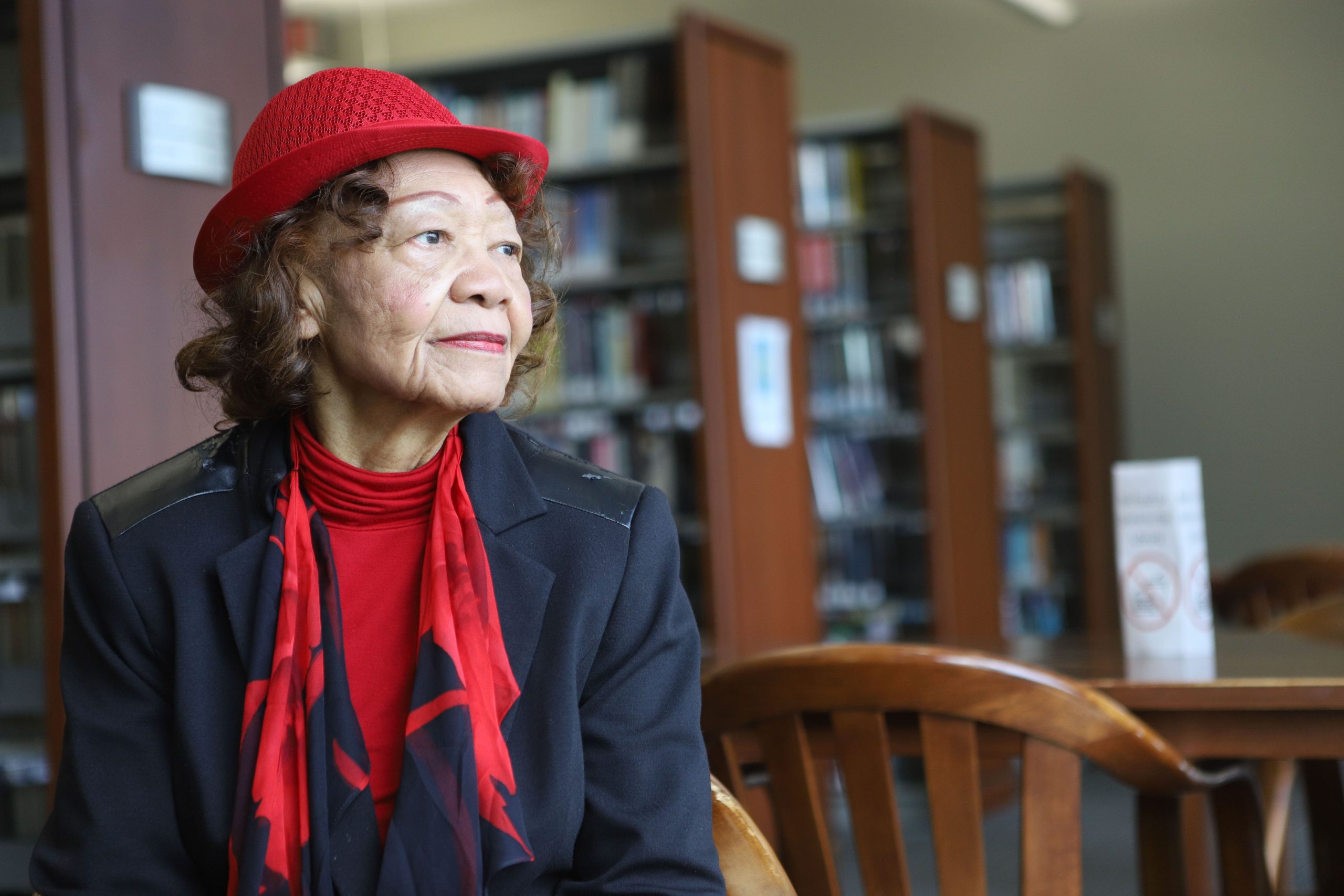
Retired Clarke County School District educator Johnnie Lay Burks sits in the Athens-Clarke County Library on March 9. Burks was the first Black teacher at Chase Street Elementary School in 1966, and the school is now set to be named after her. “That was a hard fight for us to get the barriers broken,” Burks said. “(At the time), I (was) extremely young in my career, but I’m tough.” Photo by Temprince Battle
The ODYSSEY Media Group will provide viewers with stylized profiles that center on people in the Athens community telling their own stories.
Johnnie Lay Burks, the first Black teacher at Chase Street Elementary School, has broken barriers and made change through her career as an educator.
Johnnie Lay Burks wears a black suit with a red shirt, red scarf and red felt hat that perfectly match her nails. She calls it “dressing for success,” and it’s what she’s done every day of her teaching career.
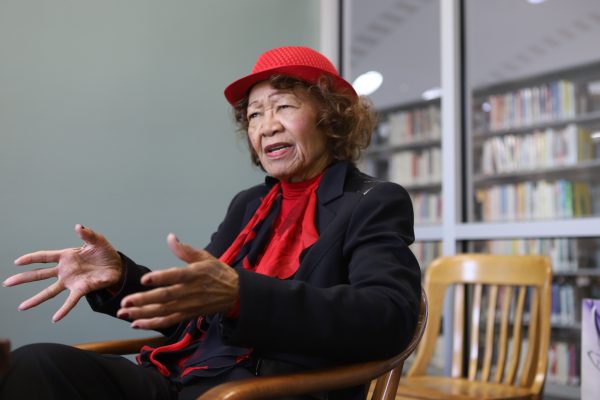
Retired Clarke County School District educator Johnnie Lay Burks sits in the Athens-Clarke County Library on March 9. Burks was the first Black teacher to integrate the formerly all-white Chase Street Elementary School, and faced a lot of hardship from the community. “Because of the color of my skin, that was the experience that I went through, and I hope that none of you would ever experience anything like that ever again. And that was a hard fight for us to get the barriers broken, the doors open, but it looks like (current students are) gonna have to take up the fight.”
She dressed for success on all the days she taught at the all-Black East Athens Elementary School, mimeographing and taping the missing chapters into textbooks to try to make up for lacking materials, resources and opportunities for the students she loved.
She dressed for success when former Clarke County School District Superintendent Samuel Wood selected her because of her exemplary teaching to integrate a school, news she had to keep quiet to avoid attracting negative attention from the community.
She dressed for success on the day she attempted to start her assigned teaching position at Alps Road Elementary, the day the principal stopped her in the school’s lobby, saying that Alps Road’s all-white faculty was “complete.”
And she dressed for success the very next day, the day in 1966 when she started as the first Black teacher at Chase Street Elementary School, soon to be named after her.
Click here to read the full story.
Now is the time (2023)

Athfactor Entertainment CEO and “Now Is The Time” Executive Producer Montu Miller visits Clarke Central High School on Feb. 14, 2022. Miller organized the “Now Is The Time” project to honor civil rights trailblazers who came before him, while also carrying on their movement. “I always wanted to do an album that was dedicated to trailblazers that came before us and kind of give them the credit they deserve, at the same time sort of taking the baton, taking the torch and sort of running with it,” Miller said. Photo by Aza Khan
As the nation celebrates Black History Month, “Now Is The Time: Shouting Fire in a Crowded Theater”, a collaborative album featuring Athens hip hop artists, is putting a spotlight on Black trailblazers.
Dedicated to Civil Rights trailblazers, created with the intent to spark change and collaborated on by artists across the Athens community, “Now Is The Time: Shouting Fire in a Crowded Theater” is more than just a regular record.
Released on Sept. 4, 2022, the eight tracks span multiple genres, but each has one thing in common— a message about the current political and social climate.
“Most of the topics we’re dealing with are the different aspects of what’s going on in society today. We wanted to make sure that (the artists) also talked about (issues) from a historical perspective as well, as today’s,” Athfactor Entertainment CEO and “Now Is The Time” Executive Producer Montu Miller said. “We’re talking about race issues, economic issues, police brutality, education, and so we touch on all of that in this record.”
Miller organized the project, a long standing dream of his, along with University of Georgia Distinguished Research Professor of English, African American Studies and Creative Writing Ed Pavlic.
“I’ve probably been thinking about that album for years,” Miller said. “Just ‘cause I always wanted to do an album that was dedicated to trailblazers that came before us and give them the credit they deserve, while at the same time taking the torch and running with it.”
Click here to read the full story.
Linnentown Lane (2023)
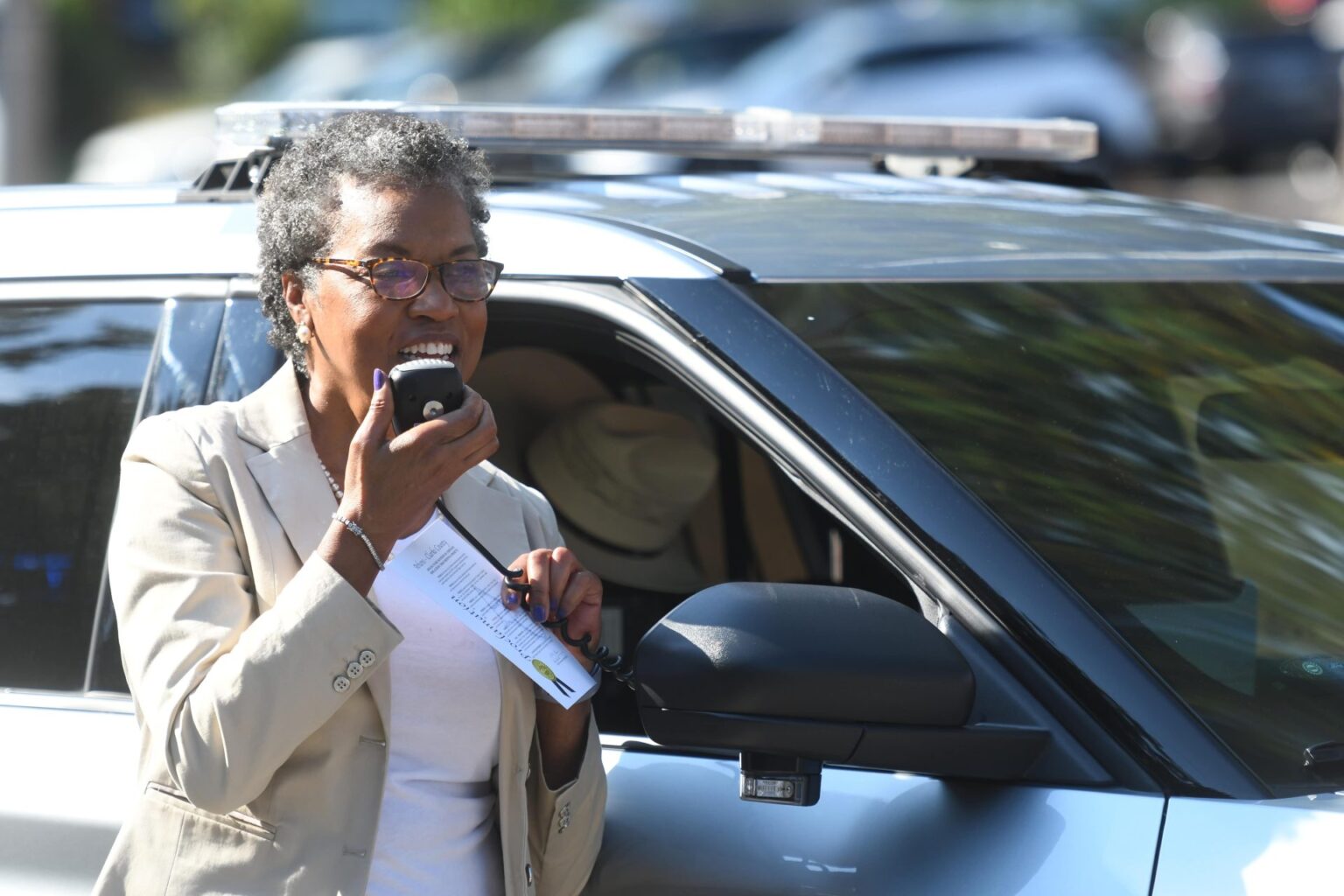
Hattie Thomas Whitehead, Linnentown first descendant and Athens Justice and Memory Project Co-Chair, speaks at the Linnentown Lane renaming event on Sept. 21. Whitehead and the Athens Justice and Memory Project encountered obstacles in the process of getting the street renamed, but ultimately achieved their initiative. “You can do things. There are obstacles gonna be always in front of you in life. You got to learn how to get around them, or under them, or over them or move them. Push whatever way you can when you get to these obstacles. Don’t let no be no: ‘Oh, you’re telling me no? Really? Well, let me find another way,’” Whitehead said. Photo by Aza Khan
On Sept. 21, an event was held to commemorate the naming of Linnentown Lane
When University of Georgia students visit the high-rise dormitories off Baxter Street, many don’t realize that in their place 60 years ago stood a tight-knit, steady Black community: Linnentown.
However, after an Aug. 1 change approved by the Athens-Clarke County Unified Government Mayor and Commission, a portion of the former South Finley Street, a street between Cloverhurst and Baxter Streets, will be renamed Linnentown Lane.
“This street is dedicated to the people of Linnentown. This street is dedicated to all of the families who worked hard, all of the families who raised their kids in this place, all the families who gathered together from house to house, making great memories,” Cynthia Jackson, Linnentown second descendant, said in a speech at the renaming event. “This street is dedicated to perseverance, it’s dedicated to endurance, it’s dedicated to all of those who continue to work hard to continue the story, who continue to raise voices of underserved people.”
The renaming is part of a larger resolution put forward by the Athens Justice and Memory Project over two years ago, which aims to provide acknowledgement and reparations for Linnentown residents. The organization has already accomplished several of its initiatives, such as receiving a formal apology from Mayor Kelly Girtz in Feb. 2021— the renaming of Linnentown Lane marks its third and latest.
“It started with the resolution, but then we voted to work with the (Athens Justice and Memory Project) on some affordable housing components. We also were looking for other ways to recognize and honor the folks of Linnentown through some type of marker or mural or mosaic. Then, the idea came up to also rename the street,” Mike Hamby, the ACC District 10 Commissioner and Athens Justice and Memory Project member, said.
Clarke Central High School students witness the Linnentown Lane renaming event between Cloverhurst and Baxter Streets on Sept. 21. The ACCGov Inclusion Office and the Athens Justice and Memory Project hosted the event to work with Linnentown residents and community stakeholders in order to address the disruption of communities due to urban renewal in Athens-Clarke County. “I (have to) admit I haven’t really covered things like this event. When I moved to Athens, I had no idea what Linnentown was before, but when I found out about this I wanted to be more involved in what was happening,” CCHS senior Emmett Greenberg said. “(This event) creates a better awareness for these (issues) that will help to ensure that people are not ignorant like I was before I moved here.” Photo gallery by Aza Khan
The Athens Justice and Memory Project brought the initiative to the ACC District commission, where it received unanimous approval. Hamby felt that this decision gave him the opportunity to make a meaningful impact on the community.
“Being a part of the (Athens Justice and Memory Project), I’ve recognized that we ought to do something,” Hamby said. “It meant a lot (to vote on the renaming). I realized how important it was, not only to Whitehead and other people who were impacted by Linnentown, but also the broader community. Doing things like this, we’re able to tell the community story, both good and bad.”
The actual renaming of the street occurred on Sept. 21 in front of a crowd of community members. ACC Inclusion Officer Remy Epps organized the event, which featured speeches from Linnentown first descendants, ACC District Commissioners and Girtz, followed by musical performances and the unveiling of the new street sign.
“My goal and my hope for this event is for those there to really understand that (the removal of Linnentown) is something that lives on. The impact is not something that is just done and people just forget, but understand that this is a long-standing impact that we’re feeling,” Epps said. “The hopes are that individuals there will really understand the importance of it and actually understand what could have been.”
Click here to read the full story.
More from Isabella Westrich
More from Isabella Gresham
More from Molly Harwell
Packaged by Luke Shannon
Packaged by Anna Shaikun
Letter From the Editor: AP African American Studies (2023)

A group of students stand in the darkness, separated from a classroom illuminated in the light of knowledge. The Florida Board of Education motioned to ban the College Board’s Advanced Placement African American Studies course, which Editor-in-Chief Molly Harwell feels was an unfair censorship of American history that is detrimental to students. “While the implementation of the AP African American Studies course at Cedar Shoals feels like a win, the fact remains that many legislator’s priority was to ensure students are kept in safe, sheltered bubbles, instead of providing them with a comprehensive education,” Harwell wrote. Illustration by Sam Harwell
The banning of AP African American Studies serves as a form of censorship in schools and takes away students’ academic freedom.
It’s no secret that the history of the United States is complicated. As much as it’s built upon the principles of liberty and justice, it has also been built upon racism, division and hatred. Fortunately, students have long had the access to learn about the complexity of the country.
In the present day however, lawmakers are trying to limit that access.
In January, Florida Gov. Ron DeSantis and his administration rejected the College Board’s newest Advanced Placement pilot program, AP African American Studies, a course that “reaches into a variety of fields—literature, the arts and humanities, political science, geography, and science—to explore the vital contributions and experiences of African Americans,” according to the College Board.
“(AP African American Studies) reaches into a variety of fields—literature, the arts and humanities, political science, geography, and science—to explore the vital contributions and experiences of African Americans.”
— College Board,
However, DeSantis stated that the course violates Florida state law and isn’t historically accurate, according to a Jan. 19 article published by the New York Times.
This decision came shortly after DeSantis signed the Individual Freedom Act, more commonly known as the Stop WOKE Act, in April 2022 to restrict how the topic of race could be discussed in schools and workplaces in Florida.
These two examples are major instances of elected officials trying to censor history for students and limit students’ academic freedom.
Click here to read the full article.
Boiling Point: Remembering Athens (2024)

How Athens appeared in the past (top) is compared to how Athens is currently presented (bottom). Athens has a rich history, from the Hot Corner Business District to Linnentown to local businesses, but some of this history has been erased from documentation. “Athens citizens should challenge themselves to learn about the history of the community around them and acknowledge the changes that have occurred,” Managing Editor Maya Clement wrote. Illustration by Sam Harwell
Managing Editor Maya Clement voices her concern that Athens citizens must recognize the city’s history before it is completely gone.
There is a layered history throughout the communities where people live, but this history is not always well-known.
In Athens, monuments, cultural landmarks and historical areas have been erased. As a result, the city has drastically shifted and citizens have been displaced, leaving the city vastly different now than it used to be.
Yet, not all of this change is common knowledge that one can find in the historical record. Some of Athens’ past, especially focusing on Black history, has been erased from history, leaving these crucial memories to be passed down from generation to generation by word of mouth.
For example, from 1962-66, dozens of Black families were displaced from their homes in a local neighborhood community called Linnentown due to an Urban Renewal Program. However, until recently Linnentown wasn’t mentioned anywhere in documented Athens history, leaving only living residents to share their experience.
In a town with a 24.6% Black population, the second greatest racial group in Athens according to the Athens-Clarke County website, the unacknowledged Black history of Athens is information that needs to be told. It is an injustice to take away such a large part of the city and population’s past.
Beyond communities, there have been changes in businesses throughout Athens. In June of 2021, local restaurant The Varsity, previously located at 1000 W. Broad St., closed after nearly 60 years of service starting at that location in 1964.
As a lifelong Athens resident, Clarke Central High School Principal Dr. Swade Huff has seen the effect of historical changes on the city.
“The word that comes to mind is surprised because you have certain communities that I’ve known since I was born that are no longer here. You have The Varsity, quarter of a mile away (from CCHS), maybe a half mile away behind Sheats Barber Shop, where I grew up because of my grandma. She still resides there and her neighbors are white,” Huff said. “For me to see the transformation, and I look back and compare when I was a kid to now, the diversity that I’m seeing in the city is different.”
If Athenians don’t recognize history, especially what is not written in history books, it will fade away until it is completely gone. Athens citizens should challenge themselves to learn about the history of the community around them and acknowledge the changes that have occurred.
Click here to read the full article.
Gallery: 2024 Black History Month Program
Athens community members and Clarke Central High School teachers and students perform during Clarke Central High School’s Black History Program in the E.B Mell Auditorium on Feb. 28. This year’s celebration was CTAE department teacher Jaclyn Brown’s second time organizing the event since bringing it back to CCHS in the 2022-23 school year. “The majority of our students represent African Americans. As of right now, the only class we have at Clarke Central that relates back to their heritage is Ethnic Studies with Ms. (Courtney)Jones and Ms. (Lawanna) Knight,” Brown said. “(The program) gives them an opportunity to have pride and to learn more about their history. Photos by Aza Khan and Izzy Duncan
Black History Month at CCHS 2024
The ODYSSEY Media Group celebrates Black History Month. Students in the Journalism I class created spotlights on influential Black figures in the Athens community, such as varsity football Defensive Coordinator Joshua Dawson. “I think success ultimately comes down to doing what you set out to do in your life. I don’t think it’s an amount of money or accomplishment, but I think it’s a feeling inside. Being able to have peace everyday, I think that’s a success,” Dawson said. Graphics by Anna Shaikun
Journalism I students showcase examples of Black history, joy and excellence in members of the Athens community.
Click here to see the full package.
Stories by Staff
Package by Anna Shaikun
There’s history in the baking (2024)

Black History Program Bake-Off organizer Roenessa Witcher poses with her cake on Feb. 28 in Room 346. Witcher coordinated the upcoming bake-off event on Feb. 28 to highlight the history of African American cuisine. “(African Americans) did have the right to sweet potatoes, lemons, really anything they were able to grow themselves,” Witcher said. “(Competitors) can bake a cake, pudding, custard, or cobbler because those are staples in the African American community.” Photo by Aza Khan
The Black History Program Bake-Off on Feb. 28 will retell the story of African Americans through a historical baking competition.
Clarke Central High School’s first Black History Bake-Off will take place on Feb. 26, with competitors bringing their own baked goods to represent African Americans of the past.
Science department teacher and Black community member, Roenessa Witcher, will host the Black History Bake-Off on Feb. 28 at 6 p.m. in the Dr. Miller B. Jordan Cafeteria. Competitors’ ingredient options will represent the lives of Jim Crow-era African Americans, whose cooking options were limited by what they could grow themselves.
“During slavery and post-slavery, African slaves (and) African Americans were not allowed to go into town and shop at the same time as their white counterparts,”Witcher said. “When they did go into town and shop they were limited to certain things. They could get ice cream but they could not get vanilla ice cream.”
Click here to read the full story.
As Diva Does (2024)
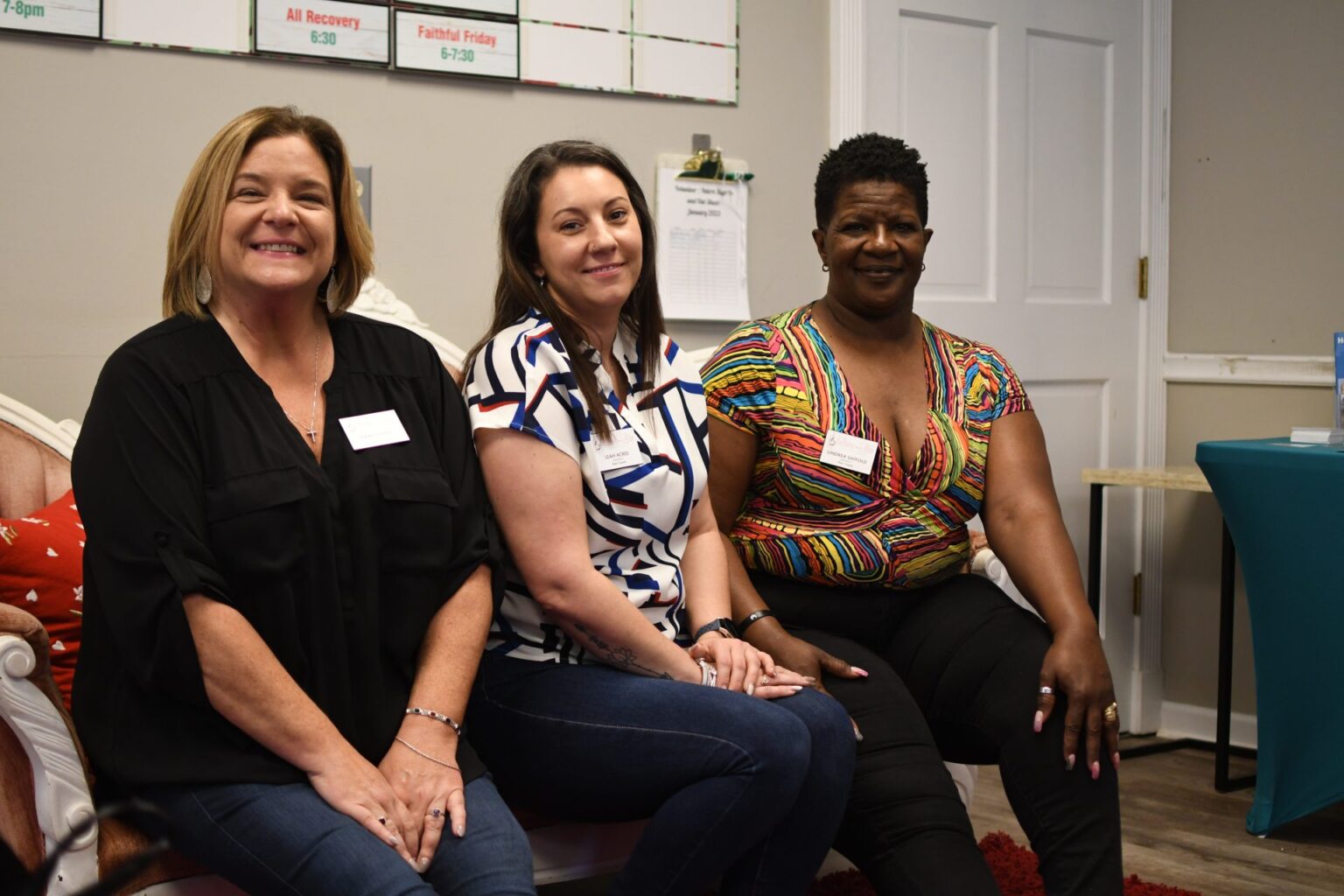
The DIVAS Who Win Freedom Center and its workers, peer mentor Undrea Gooden, Program Director Mary Evans and Facilities Manager Leah Acree are shown. After experiencing personal battles with chemical abuse, Gooden has spent the last six years working with women to overcome addiction and abuse at DIVAS Who Win Freedom Center. “I might not reach all of them, but just as I plant that one seed and I’m able to see that bloom, I’ve done what I’ve been called to do,” Gooden said. Photo by Aza Khan
Every day, Undrea Gooden stands in a garden of her own making. But instead of watering lush greens or fresh vegetables, Gooden uses her personal challenges to grow something else — the women at DIVAS Who Win Freedom Center.
After many years of chemical and substance abuse, Gooden decided to change her trajectory by seeking help from several rehabilitation facilities in Georgia. She was determined to become the best version of herself.
“I chose no longer to just exist. I want to live,” Gooden said.
Along her journey, Gooden met Chanda Santana, her counselor at New Beginnings Ministry, an organization in Martin, Georgia, that helps overcome difficult circumstances, who constantly empowered and uplifted her.
After watching Gooden grow, Chanda offered her a job to mentor other women at DIVAS, an organization located on 645 Hawthorne Ave., in Athens that offers resources to women recovering from sex trafficking, prostitution and addiction.
Here, Gooden provides women with essentials like warm meals, a place to shower and clean clothes, but DIVAS goes much further. There is also a place for women to relax, express themselves through art, prepare for interviews, work on job applications and access formal clothes for important events.
Click here to read the full article.
A vanishing act (2024)

Drama club member La’Kyla Jones, a senior, stands in the E.B. Mell Auditorium on April 30. Jones has performed in five Clarke Central High School drama productions, which has helped her gain empathy that she could bring to her own life. “You have to understand people’s feelings towards certain situations (to portray them) and you’re like ‘Oh, people in real life do feel like this,’ and then you kind of understand people in your own life,” Jones said. Photo by Aza Khan
CCHS Drama Club member La´Kyla Jones, a senior, has the power to transform into every character she plays.
Olive is a shy schoolgirl and spelling bee contestant who’s barely able to speak in front of people but comes alive when she sings. The Ballerina is a performer in a circus party that ends up with front row seats to an elephant-sized tragedy. Ronette is a street urchin who has nothing in the world except for her loyalty to her girls.
Despite their differences, drama club member La’Kyla Jones, a senior, was able to step fully into each character’s respective shoes, regardless of whether they were Mary Janes, ballet slippers, or no shoes at all.
Jones has performed five times in vastly different roles since joining the drama department when she moved to CCHS at the start of her junior year, but even before that, she has been experimenting with a wide variety of characters, such as transforming herself into a British ghost as a five-year-old.
“I try not to limit myself to one specific type of character, and I’m always pushing myself to do something different and be this person or be this character,” Jones said. “My range is what makes me unique.”
Click here to read the full article.
History in hair (2024)
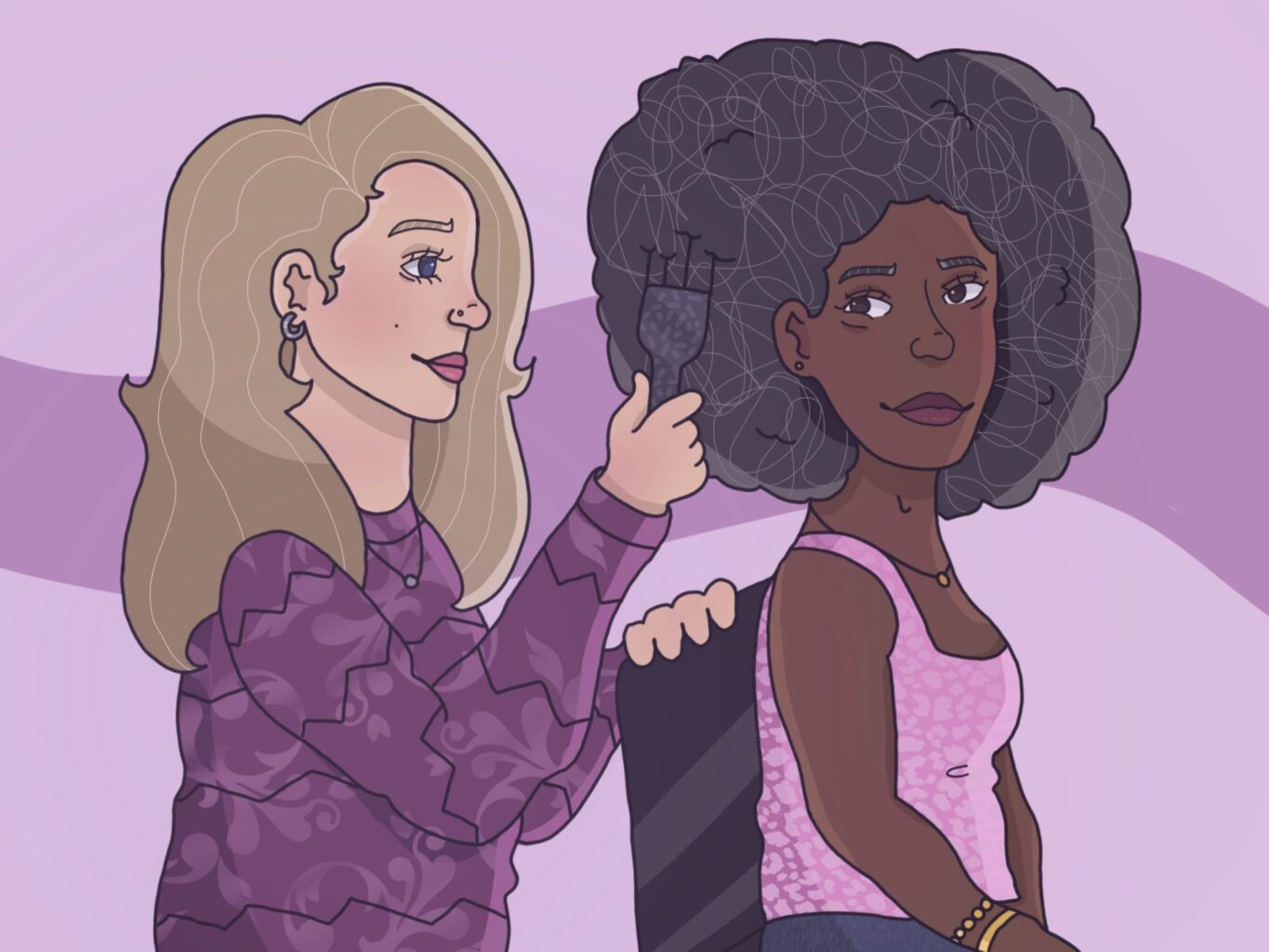
Above: PICK AND CHOOSE: A white woman admires a Black woman’s hair. Whether it is intentional or not, popular and protective Black hairstyles are often appropriated and used for style instead of being properly acknowledged. “Recently, a different group wearing Black hairstyles has emerged – a group concerned with highlights rather than history, style rather than significance. This new group is culturally appropriating Black hair,” Viewpoints Staffer Gillian Williams wrote. Illustration by Sylvia Robinson
Cultural appropriation of Black hairstyles has a detrimental effect on women of color.
From knotless braids to afros and dreadlocks, various well-known Black hairstyles today have been worn since 2050 B.C., evolving throughout centuries.
According to the History Channel, many iconic hairstyles – like bantu knots and cornrows – can be traced back to Ancient Egypt through hieroglyphics, drawings and engravings.
At the turn of the 18th century, cornrows were worn during slavery to embrace ancestral roots and sometimes as a way to show routes on the Underground Railroad, which helped slaves escape the South.
In the 1960s and 1970s the Black Power Movement embraced Black people’s natural hair. The Civil Rights Movement, which sparked the Black is Beautiful movement, helped Black women embrace their natural hair and encouraged freedom of expression.
In modern times, Black hair has been styled in various ways that still connects to its rich history but continues to change as time progresses.
However, recently, a different group wearing Black hairstyles has emerged – a group concerned with highlights rather than history, style rather than significance. This new group is culturally appropriating Black hair.
The effect of cultural appropriation on these historical hairstyles made from and by Black people and the effect on Black women is one with irreversible damage.
According to the Cambridge Dictionary, cultural appropriation is “The act of taking or using things from a culture that is not your own, especially without showing that you understand or respect this culture.”
People who don’t understand, don’t appreciate, don’t embody the intertwined history and meaning of Black hair shouldn’t wear it. When they do, it reduces the value to nothing more than the locks themselves.
Click here to read the full article.
